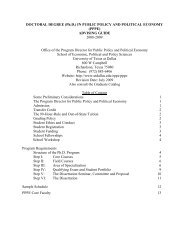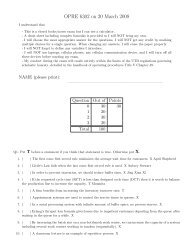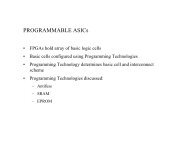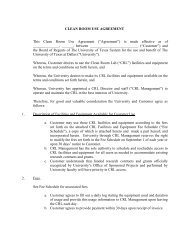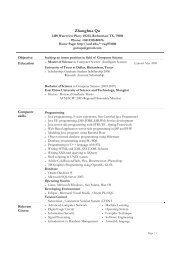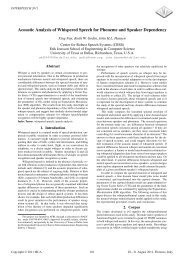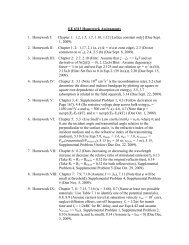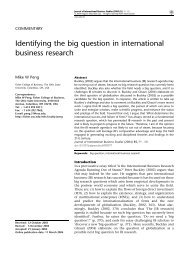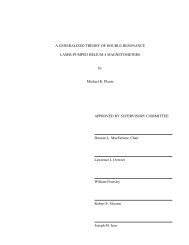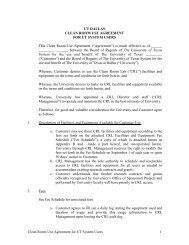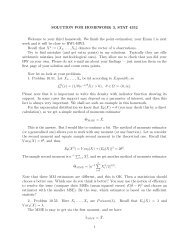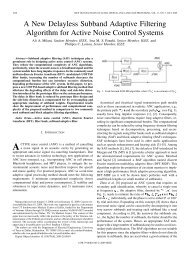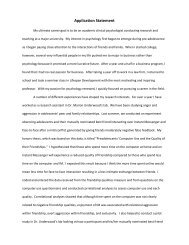Behind Intermediary Performance in Export Trade - The University of ...
Behind Intermediary Performance in Export Trade - The University of ...
Behind Intermediary Performance in Export Trade - The University of ...
You also want an ePaper? Increase the reach of your titles
YUMPU automatically turns print PDFs into web optimized ePapers that Google loves.
INTERMEDIARY PERFORMANCE IN EXPORT TRADE<br />
but will also provide a firmer basis for<br />
our knowledge about the <strong>in</strong>trigu<strong>in</strong>g phenomenon<br />
<strong>of</strong> <strong>in</strong>termediation <strong>in</strong> export<br />
trade.<br />
NOTES<br />
1. Aaby and Slater (1989), Leonidou<br />
(1995), Leonidou and Katsikeas (1996),<br />
and Madsen (1987) discussed other<br />
“miss<strong>in</strong>g l<strong>in</strong>ks” <strong>in</strong> the literature.<br />
2. Historically, EMCs work as agents<br />
and do not take title to the goods, and<br />
ETCs are merchants who take title. However,<br />
recently, about 50% EMCs have<br />
taken title to the goods while still call<strong>in</strong>g<br />
themselves EMCs (Peng, 1998, p. 16).<br />
Thus, the traditional dist<strong>in</strong>ction between<br />
the agent-EMC and the merchant-ETC<br />
becomes <strong>in</strong>creas<strong>in</strong>gly blurred and is no<br />
longer valid. Accord<strong>in</strong>g to the U.S. Department<br />
<strong>of</strong> Commerce (1985, p. 4),<br />
“<strong>The</strong>re is no clear cut dist<strong>in</strong>ction between<br />
EMCs and ETCs. Many former<br />
EMCs now call themselves ETCs. Both<br />
ETCs and EMCs may take title to goods<br />
or work on commission.” <strong>The</strong>refore, <strong>in</strong><br />
this article, we call them “export <strong>in</strong>termediaries”<br />
regardless <strong>of</strong> how they actually<br />
label themselves.<br />
3. While transaction cost and agency<br />
theories are not always complementary,<br />
Williamson argued that these two theories<br />
are very similar <strong>in</strong> their managerial<br />
discretion and efficient contract<strong>in</strong>g orientations,<br />
and that their behavioral assumptions<br />
are “substantially identical”<br />
(1988, p. 569).<br />
4. Although some authors dist<strong>in</strong>guish<br />
between “resources” and “capabilities,”<br />
“it is likely that they will become badly<br />
blurred <strong>in</strong> practice” (Barney, 1997, p.<br />
144). Thus, we use the terms “resources”<br />
and “capabilities” <strong>in</strong>terchangeably.<br />
5. It is possible that over-reliance on<br />
export <strong>in</strong>termediaries may impose constra<strong>in</strong>ts<br />
on export development <strong>in</strong> the<br />
long run. As a result, exporters <strong>of</strong>ten<br />
phase out <strong>in</strong>termediaries, after export<br />
sales reach a high volume. Consequently,<br />
export <strong>in</strong>termediaries <strong>of</strong>ten proactively<br />
search for smaller clients which<br />
are first-time exporters, or larger clients<br />
which may be <strong>in</strong>terested <strong>in</strong> newer markets<br />
not currently covered by their <strong>in</strong>house<br />
channels.<br />
6. Tak<strong>in</strong>g title to the goods is not the<br />
only <strong>in</strong>dication <strong>of</strong> commitment <strong>in</strong> the<br />
pr<strong>in</strong>cipal-agent relationship. However,<br />
for researchers, tak<strong>in</strong>g title is one <strong>of</strong> the<br />
most unambiguous measures to empirically<br />
capture such commitment – hence,<br />
our focus on this dimension.<br />
7. This hypothesis that specialization<br />
<strong>in</strong> commodities, where entry is likely<br />
easier, may generate greater performance<br />
for <strong>in</strong>termediaries may seem counter-<strong>in</strong>tuitive,<br />
but this is exactly what transaction<br />
cost theory (Williamson, 1985)<br />
would suggest. Although direct tests <strong>of</strong><br />
this hypothesis, until this study, were<br />
not available, transaction cost-based empirical<br />
studies (Anderson and Coughlan,<br />
1987; Aulakh and Kotabe, 1997; Campa<br />
and Guillen, 1999) documented that<br />
manufacturers <strong>of</strong> complex products are<br />
likely to forward <strong>in</strong>tegrate distribution<br />
channels, thus strongly imply<strong>in</strong>g that <strong>in</strong>termediaries<br />
attempt<strong>in</strong>g to specialize <strong>in</strong><br />
these products are not likely to do well<br />
(Peng, Hill, and Wang, 2000).<br />
8. Types <strong>of</strong> clients <strong>in</strong>cluded (1) firms<br />
un<strong>in</strong>terested <strong>in</strong> export<strong>in</strong>g, (2) occasional<br />
exporters, (3) established exporters, and<br />
(4) globalized firms.<br />
9. We did not directly ask for <strong>in</strong>formation<br />
about these two ratio-based measures,<br />
which would require more computation<br />
and might trigger nonresponse.<br />
Instead, <strong>in</strong>formation about three simple<br />
measures, (1) export pr<strong>of</strong>its, (2) export<br />
earn<strong>in</strong>gs, and (3) the number <strong>of</strong> people <strong>in</strong><br />
each firm, was asked separately <strong>in</strong> the<br />
342 JOURNAL OF INTERNATIONAL BUSINESS STUDIES



